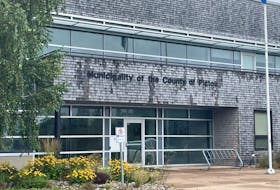Central Nova MP Sean Fraser said Canada cannot instantly “flick the switch,” to a greener economy as Ottawa and Halifax grapple with offshore natural gas exploration.
But a natural gas boom remains unlikely for now, as the provincial government has a fracking ban and federal MPs are discussing potential changes to environmental reviews of resource exploration, coupled with protecting marine areas.
At the same time, the Canadian government must focus on cutting greenhouse gas emissions and developing clean energy to combat climate change, which it agreed to do when it signed the 2015 Paris Agreement. Both Canada and other Paris signatories committed to limit global warming to 1.5 degrees Celsius.
“We’re not going to be able to flick the switch in Canada or anywhere in the world and say tomorrow all of sudden we’re going to reach the goals,” said Fraser. “We have to be serious about tackling the threat posed by climate change and at the same time take advantage of the opportunities.”
This means the federal government is still willing to consider using fossil fuels, including offshore gas reserves and supporting the controversial Kinder Morgan pipeline project in British Columbia.
At the same time, Ottawa is rolling out a nationwide carbon pricing plan that Environment Canada says will remove up to 90 million tonnes of carbon dioxide from the atmosphere by 2022. This is equal to taking more than 20 million cars off the road.
At the provincial level Alberta – a major oil and gas exporter – has capped its own greenhouse gas emissions.
Other provinces and American states have also launched their own cap-and-trade programs to cut emissions, notably Ontario, Quebec and California.
“This is widely thought and accepted to be the most efficient way to reduce emissions around the globe,” said Fraser.
However, climate change is already having a major impact on Canada as hotter temperatures drive more extreme storms, flooding and wildfires.
In 2013, Fraser himself was forced to evacuate his old home in Calgary as severe floods swept through southern Alberta.
Pictou County and Nova Scotia are not immune, as the province will see heavier rainstorms, rising sea levels and even invading parasites threatening wildlife.
According to Fraser, climate change is currently costing Canada $5 billion. This figure is estimated to rise to $21-43 billion by 2030.
“We’re feeling the consequences of climate change today,” said Fraser.
However, he added that if Canada embraces renewable energy and a greener economy, it can tap into a global economic opportunity estimated to be worth $23 trillion.

![['Central Nova MP Sean Fraser.']](https://saltwire.imgix.net/politics-3088077.jpg?cs=srgb&fit=crop&h=568&w=847&dpr=1&auto=compress%2Cformat%2Cenhance)







